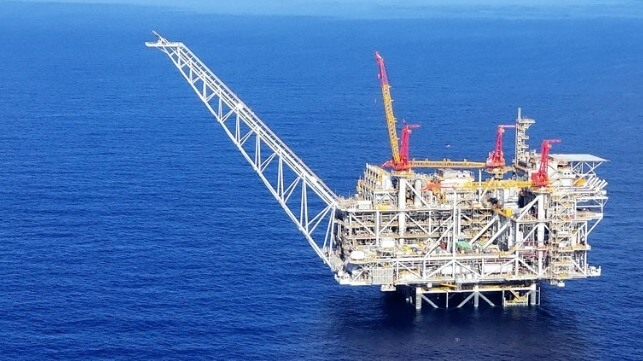Russia's Pariah Status Creates Opportunity for Israeli Offshore Gas

The European Union is in talks with Israel over a plan to import Israeli natural gas, helping Europe in its project to wean itself off of Russian supplies.
Israel's prolific offshore natural gas resources, like the Leviathan field, are only beginning development. However, at present the nation has limited access to market. An ambitious plan to run a subsea pipeline from Israel to Cyprus to Greece - the EastMed project - lost American support and stalled early this year due to contentious regional politics. Turkey claims a substantial part of Cyprus' offshore reserves as its own, and the idea of a pipeline that would bypass Turkish interests and bring Cypriot gas to Europe was inflammatory to the administration of Turkish President Recep Tayyip Erdogan.
“The demise of the EastMed pipeline will remove a major cause for tensions in the region, as there will be one less area where Turkey feels boxed in by regional developments,” Emre Peker of the Eurasia Group told Politico earlier this year. "While the gas link was always more a political pipe dream than a realistic project, it nevertheless contributed to instability by provoking Ankara's anger."
Turkey wants to see Israeli gas flow through its own pipeline network to Europe, mirroring the arrangements that Turkish pipeline operators have with Russian and Azerbaijani suppliers. The route envisioned would pass through the Cypriot EEZ; as coastal states do not have jurisdiction over the installation of transboundary pipelines within their EEZs, Cyprus has a fraught relationship with Ankara, and diplomatic friction would be likely.
The other export options for Leviathan include an overland pipeline to carry Israeli gas to Egypt via Jordan; an FLNG project at the Leviathan production site, which could produce 2.5-5 million tonnes per annum; or a subsea pipeline connection to an LNG plant in Egypt, from where the gas could be freely exported to the global market.
The Egyptian LNG export option appears to be gaining traction. The Israeli Energy Ministry recently announced that it is in negotiations with the European Union over the possibility of using Egypt's two LNG plants for this purpose. As a starting point, existing infrastructure would be used to ship 1-2 billion cubic meters over the span of the next winter season. The diplomatic objective is to double this amount within several years' time.

that matters most
Get the latest maritime news delivered to your inbox daily.
“Egypt has two gas liquefaction facilities and is able to export gas to Europe, where they have the facilities to turn it back into gas,” Energy Ministry Director-General Lior Schillat said last week. "[The EU has] officially asked for Israel’s help to get through the energy crisis."
The cooperation between Israel and the EU is a long-term arrangement, Schillat says, as Europe is expected to need a steady supply for years in order to replace Russian gas.
